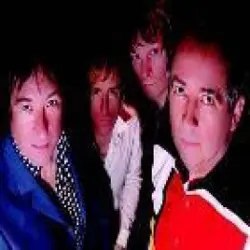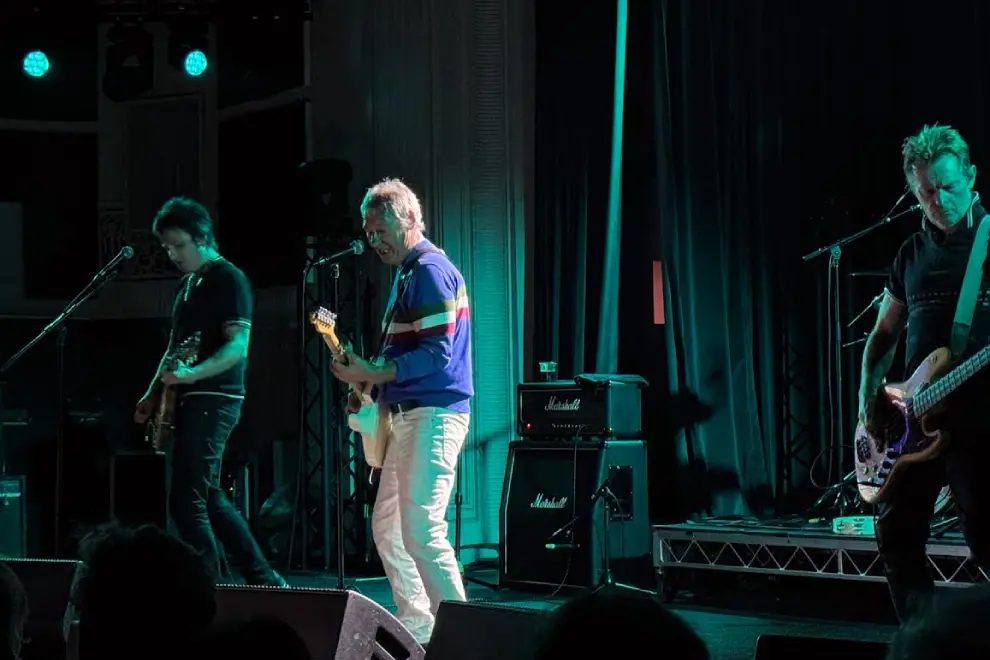 Buzzcocks
BuzzcocksOutside, it feels like summer is finally here. It is a balmy Saturday night, and music spills from busy bars and restaurants onto the tumult of High Street. Inside the Northcote Theatre, around one thousand people eagerly wait to be taken back to the London winter of 1982.
On stage is Modern English. The British post-punk quintet, who formed in 1979, are playing their first ever show in Melbourne, and at least the first three rows of the crowd are in thrall to the men dressed in flattering black. As the band work their way through tracks from their new album, 1,2,3,4, ("We couldn't believe no one had used that title before", singer Robbie Grey tells the crowd), song after song leans into the icy melodic punk rock they helped invent in the early 1980s. And if you had played a part in inventing this sound, as Modern English did, why would you? It's spellbinding stuff.
The band gel, the sound is powerful and the audience, many of whom are here for nostalgic reasons, welcome the surprise in new songs like Long In The Tooth and Not My Leader. Many of these are driven by the work of bassist Mick Conroy, whose blend of Peter Hook-style strumming and melodic is an asset. Older songs like Carry Me Down, Tables Turning and Swans On Glass – "our first single on 4AD", Grey informs us – sound excitingly fresh. "There are so many Joy Division t-shirts," he observes as the room, now almost at capacity, awaits the band's last track.
“We’re going to finish with this song that I think you might know,” Grey says. We cheer, and the band dive into the titanic eighties classic, I Melt With You, a song about having sex during an atomic bomb blast, and one not fully appreciated until its inevitable inclusion in the series Stranger Things.
Don't miss a beat with our FREE daily newsletter
A song with a chorus so good it can sustain a career and bring a band to the other side of the world 42 years after its release. As the closing chords fade and the band raise their arms to the roof, the guy next to me leans over to share his thoughts: “It really is a banger.”
Arriving to the strains of Thus Spake Zarathustra, best known for announcing the dawn of life in the film 2001: A Space Odyssey, Buzzcocks come on stage one by one, similarly raising their arms to the sky. Partway through the previous set, Modern English singer Robbie Grey warned us, "The Buzzcocks set will hit you like a train." Opening with punk classic What Do I Get?, the headliners set about living up to that introduction.
Unbridled enthusiasm is what the band is best known for, and Steve Diggle, the only member of the band's original lineup, inhabits it like few others. Backed by the impassive precision of bassist Chris Remington, the flawless drumming of Danny Farrant and the notably younger guitarist Mani Perazzoli, the band charge through a brace of short punk classics: I Don't Mind, Everybody's Happy Nowadays and Promises.
The songs work, and Diggle sells them beautifully, even if one of their greatest qualities, the delivery of sadly deceased singer-songwriter Pete Shelley, is missing. Watching the band prompts some big questions. How do you be a punk at 69? Do you faithfully invoke the past, trust the audience to bring their personal associations to your music and let them complete the performance? Do you fake the emotions that inspired these songs you wrote and played when you were a teenager? Do you find new sources of anger? Do you use the songs as a time travel machine and make it a purely personal experience?
Buzzcocks are spared from this conundrum with qualities shared by few of their contemporaries: Popnous and a sense of humour. Shelley's wry, queer outsider takes on northern English adolescent lives are still so joyous, declarative and honest that the collective act of their performance becomes the answer.
"This next song is for the people of Gaza," Diggle says, now deep into the set and without a hint of exhaustion. As the band begin Autonomy, a song whose title he used for his autobiography, cries of "Free Palestine" and loud cheers echo around the room. The fist we saw raised in welcome when he arrived on the stage takes on a new meaning when he punches the air now. It's a reminder of what other bands on the series of Rock Against Racism concerts of the late 1970s did best: they used their profile to highlight struggles faced by others and ensured the door was left open for post-punk to become a far more diverse style of music.
By the end of Autonomy, we are treated to perhaps the biggest singalong of the night and one of the greatest odes to sustaining sexual tension ever written: Why Can't I Touch It? It's a perfect example of how the band capture the frailties of adolescence and elevate them with songwriting for three minutes.
Swathes of pop punk enthusiasts have followed in their wake, but none have captured the power inherent in the naive simplicity of a song like this. “It’s Friday night in Melbourne. Is everyone having fun?” asks Diggle as another of their hits, Love You More, fades away. The first part of his statement may be wrong, but the second part is spot on. When you can follow any statement with Orgasm Addict and Boredom – two of the greatest punk songs ever written – all will be forgiven.
Why Diggle is wearing an Australian sporting t-shirt for the encore and has an Australian flag over his amplifier is never addressed. Perhaps it was, but his Mancunian accent is so strong and enthusiasm so great that most of his banter was reduced to enthusiastic gestures and endorsements of whatever is going on around him, which is kind of what punk shows were all about anyway.
As the band careen toward the end of their six-song encore with the unfailingly great Ever Fallen In Love and Harmony In My Head, a small moshpit bursts to life in front of Diggle, arresting the attention of the security guards who let it play out. Even as he leaves the stage, Diggle is leaping, bounding, full of life, the perfect vehicle for what punk did best: genuine life-affirming music that found a virtue in simplicity and the songs to match it.



















